 SNAP plays a critical role in reducing hunger, food insecurity, and poverty for millions of women and families. SNAP lifted 3.1 million people out of poverty in 2018. In Fiscal Year (FY) 2017, SNAP served more than 42.1 million people in nearly 20.8 million households on average each month. Women make up 63 percent of non-elderly adult SNAP recipients. Despite Congress just passing a bipartisan Farm Bill that protects SNAP, the Trump Administration proposed a rule that would take SNAP away from 3.1 million people, free school meals from 500,000 children, and WIC from people who would lose SNAP benefits if this proposed rule is finalized and implemented.
SNAP plays a critical role in reducing hunger, food insecurity, and poverty for millions of women and families. SNAP lifted 3.1 million people out of poverty in 2018. In Fiscal Year (FY) 2017, SNAP served more than 42.1 million people in nearly 20.8 million households on average each month. Women make up 63 percent of non-elderly adult SNAP recipients. Despite Congress just passing a bipartisan Farm Bill that protects SNAP, the Trump Administration proposed a rule that would take SNAP away from 3.1 million people, free school meals from 500,000 children, and WIC from people who would lose SNAP benefits if this proposed rule is finalized and implemented.
NWLC submitted a comment to the U.S. Department of Agriculture (UDSA) opposing this proposed rule. NWLC’s comment described how states’ “broad-based categorical eligibility” flexibility helps ensure that women, children, and families struggling to make ends meet can put food on their table by (1) supporting work by eliminating the “benefit cliff” workers face as their earnings rise, helping low-income families pay for other necessities like child care and housing that allow them to work, (2) helping low-income families save for future financial emergencies, and (3) making administering SNAP easier. The comment also described how the proposed rule would harm women (especially low-wage working women, mothers, and women with multiple marginalized identities such as women of color, immigrant women, LGBTQ women, women with disabilities, senior women), children, and states that would face increased administrative costs.

